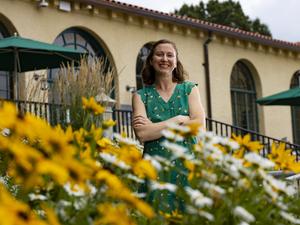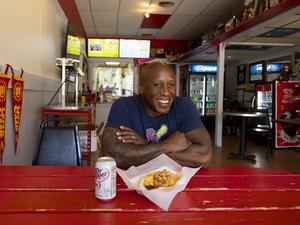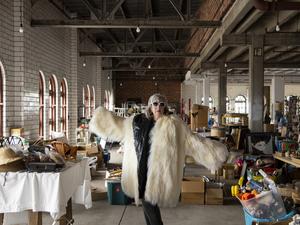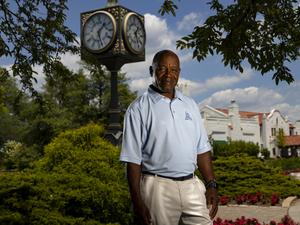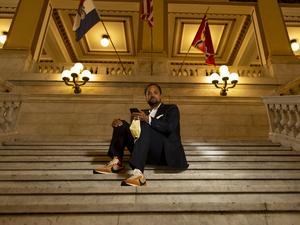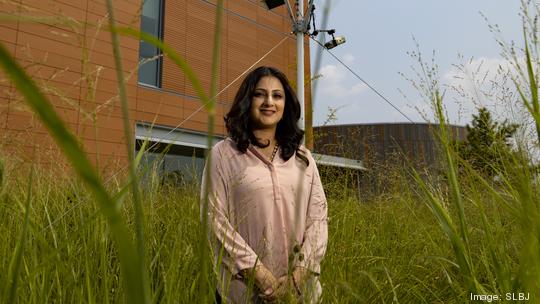
Nadia Shakoor has always had an interest in plants, so much so she decided to make a career out of it.
Shakoor is a senior research scientist at the Donald Danforth Plant Science Center, where she operates her own research lab. She began at the Danforth Center in 2014 in a postdoctoral role in the lab of scientist Todd Mockler.
Shakoor is both a scientist and an entrepreneur, holding the roles of co-founder and CEO of St. Louis agtech startup Agrela Ecosystems. The company has developed a crop sensing and monitoring platform called PheNode.
“You can envision it like a weather station, but for plants,” Shakoor says of PheNode.
In addition to PheNode, Shakoor is also advancing another farm technology system called the FieldDock, a project backed by a $1.4 million grant from the National Institute of Food and Agriculture and the National Science Foundation.
Shakoor lives in University City with her husband and 1-year-old son.
What does your research focus on? Essentially what I work on is using and developing these integrated digital agriculture systems to study the effect of phenotypes, genetics and the environment on crop productivity. Right now, there’s a lot of really neat tools, methods, technologies to optimize the ability of crops to do certain things. Right now, I’m very interested in the ability of sorghum, which is what I did my Ph.D. in, to capture carbon dioxide from the atmosphere and store it in its roots, shoots and leaves.
Where does your interest in crops and plant science come from? I grew up here in the Midwest surrounded by farm fields, so there’s always an affinity for this kind of lifestyle and culture. I did my undergraduate degree at the University of Illinois in Urbana-Champaign, which is a pretty big agricultural school, and was exposed to various plant course work. So I always had an interest in plants in general. It just kind of grew out of that, literally.
You worked in an R&D role for beauty brand L’Oréal out of college. What did that involve? While I was in college, I had an opportunity to do an internship, when I was a junior, at L’Oréal for a summer developing hair care products as a chemist. At the end of the internship, they offered me a job. As someone getting their bachelor’s degree, it was really exciting to have a job lined up and travel a little bit. I moved out to New Jersey, where their global R&D headquarters are, and worked there for about five years as a research and development chemist, making hair care products of all things. It was actually really neat. I could walk to the store and see what I made in the lab, like a bottle of shampoo or whatever it might be.
How did you come up with the idea of the PheNode? The idea of the PheNode came about because we collect a lot of crop data from the field. That is generally called phenotyping, where we understand the traits of plants whether it’s how tall it is, how big it is, how healthy it is. There’s ways in which we measure those parameters. We use tools to do that and, a lot of times, there’s all these different tools that you lug out to the field and you take manual measurements. Back in 2015 and 2016, I really wanted a device that could sit out in the field and gather data autonomously all the time without anybody having to go out physically to do it. The idea was if I can monitor what’s going on from my front porch, I should be able to monitor what’s going on in my field. At the time, there weren’t very many technologies out there to do that, so we embarked on this adventure to build it ourselves.
You’re developing the FieldDock. What does that system do? This is taking PheNode and taking it further ahead. It’s basically an all-in-one sensor platform that has the PheNode as sort of the brains of the system. But in addition to capturing all of the environmental data from multiple sensors, it deploys automated drone flights and helps manage farm operations. It also has got a wireless soil sensing network as well. It is a little bit more of a complex, smart farm system. We are in year two of that project and we are just about to finish building our first prototype of that system.
What do you like to do in your free time? I have a 1-year-old, so he takes up a lot of my time. I have seven pet chickens. They also take a little bit of my time. I also enjoy photography and true crime podcasts. "Criminal" and "Crime Junkie" are my favorites. I also love going on neighborhood walks with my husband and kiddo and just appreciating the architecture and unique houses in St. Louis.
What’s something people may not know about you? Another thing I’m working on right now is getting my drone pilot license. That’s keeping me busy as well.
More about Nadia Shakoor
Title: Senior research scientist and principal investigator at the Donald Danforth Plant Science Center
Age: 38
Family: Shakoor and her husband have a 1-year-old son.
Hometown: Springfield, Illinois
Education: Shakoor has a Bachelor of Science degree in molecular and cellular biology from the University of Illinois at Urbana-Champaign, a Master of Science degree in molecular genetics and cell biology from the University of Chicago and a Ph.D. in integrative biology (emphasis in plant functional genomics) from the University of South Carolina.
